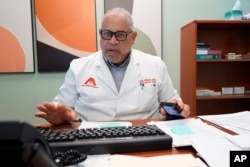As rural hospitals in America continue to struggle financially, new types of hospitals are slowly taking root, especially in the Southeast.
Rural acute care hospitals receive more than $3 million in federal funding annually and higher Medicare reimbursements in exchange for closing all inpatient beds and providing 24/7 emergency care. While that makes it easier for hospitals to stay open, experts say it doesn’t solve all of the challenges facing rural health care.
People may need to travel further for illnesses that require hospitalization, such as pneumonia or COVID-19. In some communities where hospitals have converted to new names, residents are confused about what kind of care they can get. Additionally, rural hospitals are hesitant to make changes because there is no room for error.
Carrie Cochran-McLean, chief policy officer at the National Rural Health Association, said it’s “ironic” that the agencies most in need cannot afford to take the risk. She noted that certain services and benefits would have to be waived, such as a federal discount program on prescription drugs.
The government classifies hospitals by type and launched a rural emergency hospital option in January 2023. Last year, 19 hospitals in the United States received rural emergency hospital status, according to the Shepps Center for Health Services Research at the University of North Carolina.
Most are in the South, with some in the Midwest.
George Pink, associate director of the Rural Health Research Program at the Shepps Center, said the designation targets a very specific population: rural hospitals on the verge of closing, with few people able to receive inpatient care.
Save Rural Care
Such was the case at Owen County Hospital in Oceola, Georgia, the second rural acute care hospital established in the United States
In the weeks leading up to the switch, the hospital received at least $1 million in credit from the county so it could pay employees — money that County Board of Supervisors Chairman Scott Carver doubted would be returned.
“We have a $6 million budget for the county, so extending this line of credit would be somewhat risky for us,” he said. “But … we felt we had to try it.”
Owen County Hospital became a rural emergency hospital on February 1, 2023. Quentin Whitwell, the hospital’s chief executive, said it was an ideal candidate.
“Given that this is a new thing, we’re still learning what some of the impacts are,” said Whitwell. Through his company, Progressive Health Systems, Whitwell owns and manages six hospitals in the Southeast, most of them Rural emergency hospitals may have application designation. “But the transformation of a rural acute care hospital changed the hospital.”
Carver said the combination of state programs and tax credits, plus the new designation, means the hospital has $4 million in the bank. In short, the work was worth it to him.
Longtime Oceola resident Traci Harper isn’t so sure. About a year ago, she rushed her son to the hospital for emergency treatment for meningitis.
Because the new designation required hospitals to transfer patients to a larger hospital within 24 hours, Harper’s son was sent to another hospital in the state and ended up getting what he needed three days later at a hospital in Jacksonville, Florida. care.
“It’s still two hours away,” she said. “I’ve always been able to take him there myself, but no one told me that.”
Barely surviving
Nebraska’s first rural emergency hospital opened in February in a city called Flanders.
Warren Memorial Hospital has reached a breaking point: Federal pandemic relief funding has dried up. The city government, which owns the hospital, had to start extending credit lines so hospital employees could get paid. A major street repair project has even been delayed, said Jared Chaffin, the hospital’s chief financial officer and one of three co-CEOs.
“Back in the summer, we were barely surviving,” said Amy Thimm, the hospital’s vice president for clinical services and quality and co-CEO.
Although residents expressed concerns about the closure of inpatient services at a September town hall, the importance of emergency care outweighed other concerns.
“We have farmers and ranchers and people who don’t have time to drive an hour to get medical care, so they don’t,” said Ron Te Brink, co-CEO and chief information officer. “Rural health care is extremely important to many Nebraska communities like ours.”
The first federal payment, approximately $270,000, arrived on March 5. Chafin expects the hospital to bring in $6 million in revenue this year — more than ever before.
“It’s crazy, especially for a small hospital like ours here,” he said. “We still have Mount Everest to climb, and we still have a lot of work to do. This designation alone is not a savior for the hospital—it is a lifeline.”
Rural troubles
That lifeline has proven difficult to maintain for Alliance Health System in Holly Springs, Mississippi, another Whitwell hospital and the fourth in the country to be remodeled.
Months after it was approved as a rural acute care hospital in March 2023, the Centers for Medicare and Medicaid Services reneged on its promise.
The government says the hospital is not a rural hospital because it is less than an hour from Memphis, hospital CEO Kenneth Williams told The Associated Press. A CMS spokesperson said the facility “inadvertently achieved certification.”
Williams said the hospital has until April to return to full service, but many in the community, mostly retirees, believe the hospital is closed. The number of patients is at an all-time low. Williams isn’t sure the hospital will survive if federal payments stop.
“If we hadn’t done this, we might have closed [become a rural emergency hospital]so … something has to be done,” he said. “Am I sorry for all the problems we’ve caused for some reason? [hospitals] No? I have no idea. ”
While Alliance appears to be one of the few facilities negatively impacted by its conversion to a rural acute-care hospital, Pinker said it’s too early to tell whether the federal designation will be successful.
“If my gut feeling is correct, it may work well for some communities but not so well for others,” he said.
Follow us on Google news ,Twitter , and Join Whatsapp Group of thelocalreport.in

















